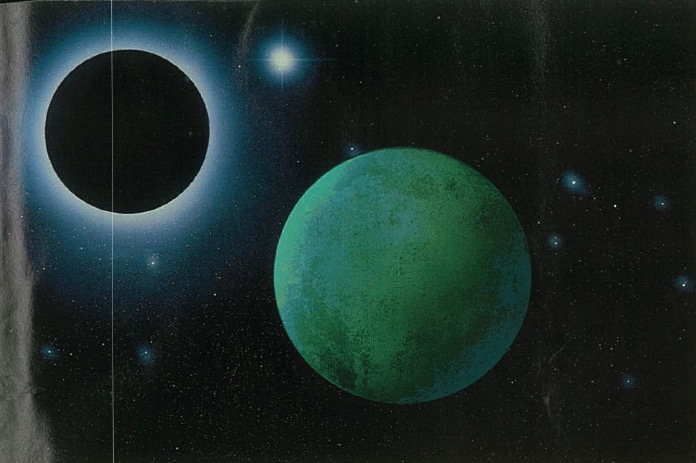Every hotel in Guadeloupe has been booked for months by people eager to witness the coming total solar eclipse which will cross the Caribbean Sea on February 26. Other skygazers have made reservations via the Internet to be at ground zero aboard pricey yachts to experience the sudden darkness and drop in temperature as the shadow of the moon falls directly upon them. But according to Hindu astrology, you should think twice before setting sail. It may be interesting, but not in your best interests. Our ancient seers would probably recommend jumping overboard rather than peering through a pair of binoculars at the disappearing sun (even with suitable filters). Traditional advice is to be immersed in a river and chanting during an eclipse to mitigate the negative effects, because mantras performed in water have more power. But nowadays some ask, “Isn’t this all superstition?”
The word eclipse in itself has foreboding indications, coming from the Greek ekleipsis, meaning “failure to appear.” A solar eclipse occurs when the Moon comes exactly in line between the Sun and Earth, obscuring or eclipsing the light of the Sun from an area on the planet. Some Rig Veda hymns refer to eclipses, which figure later prominently in the Mahabharata. Certainly in the absence of knowledge, an eclipse is a terrifying event. One of the earliest recorded eclipses was in 2136 bce. The Chinese Imperial Emperor Chung K’ang was horrified to see the Sun disappear. His two court astrologers, Hsi and Ho, failed to predict it, so the necessary countermeasures to make the Sun return–e.g., shooting arrows at the sky, beating drums and shouting–were not performed. Yet, the sun returned quite on its own, casting royal doubt upon the usefulness of Hsi and Ho. Both were summarily executed by the Imperial army. To this day, in many areas loud noises are made to chase the moon away during an eclipse.
Eclipses have a known correlation with an increase in earthquakes. Researchers speculate that the stronger gravitational force generated by the combined tidal force of the Sun and Moon pulling along the same axis disturbs the crust of the Earth and sets the stage for earthquakes to occur immediately or shortly thereafter. Recent examples are the 6.4 quake which took place near Mumbai on September 29, 1993, the day of a lunar eclipse, and the devastating 8.6 quake in Kobe, Japan, on January 20, 1995, again the day after an eclipse.
From the astrological point of view, the eclipse affects everyone on the planet, not just those in its visible path. The Hindu astrological treatise Brihat Samhita is replete with gloomy descriptions of what to expect from eclipses, depending on the particular part of the sky they appear in. It does offer some hope, though, for, “If within seven days there should be a clear shower, there will be prosperity and peace in the land, and anything untoward due to the eclipse will be warded off completely.”
On a personal level, astrologers see the zodiac sign in which the eclipse occurs as an area of emphasis or possible crisis in the affairs related to that house in an individual’s horoscope. Astrologer Chakrapani Ullal explains it as “an obstruction of the life forces” of those energies governed by that house, an impact which can be compounded by other aspects of the person’s astrology. For example, the February 26th eclipse is occurring in Aquarius, so if Aquarius falls in the second house of your horoscope, it could cause disruption in your financial affairs. Or, if Aquarius lies in your seventh house, relationships or marriage could be debilitated. Brihat Samhita asserts expiatory ceremonies can ward off potential calamities that would otherwise befall the person or his family.
Many astrologers believe eclipses have a delayed impact, which is later triggered by the movements of the planets. B.V. Raman advises avoiding important events, especially marriages, during certain days in the six months following an eclipse. Those days are when the moon is in the same nakshatra (constellation–satabhisha) as during the eclipse.
So, should you book a rock in the nearest river, instead of a suite on a cruise ship? Not because you’re superstitious, of course, but because you don’t believe in taking chances. It’s up to you. Many who have experienced a total eclipse of the Sun can attest to the very real impact it has upon the conscious mind, which seems to become temporarily unhinged. Astrologically, the impact depends upon your own chart. Remedies are possible, especially through intense sadhana, spiritual effort, but few people these days have the time or will to really employ them. At least we can rest assured the Sun will return on schedule–our astronomers not wanting to risk the fate of Hsi and Ho in ancient China.
